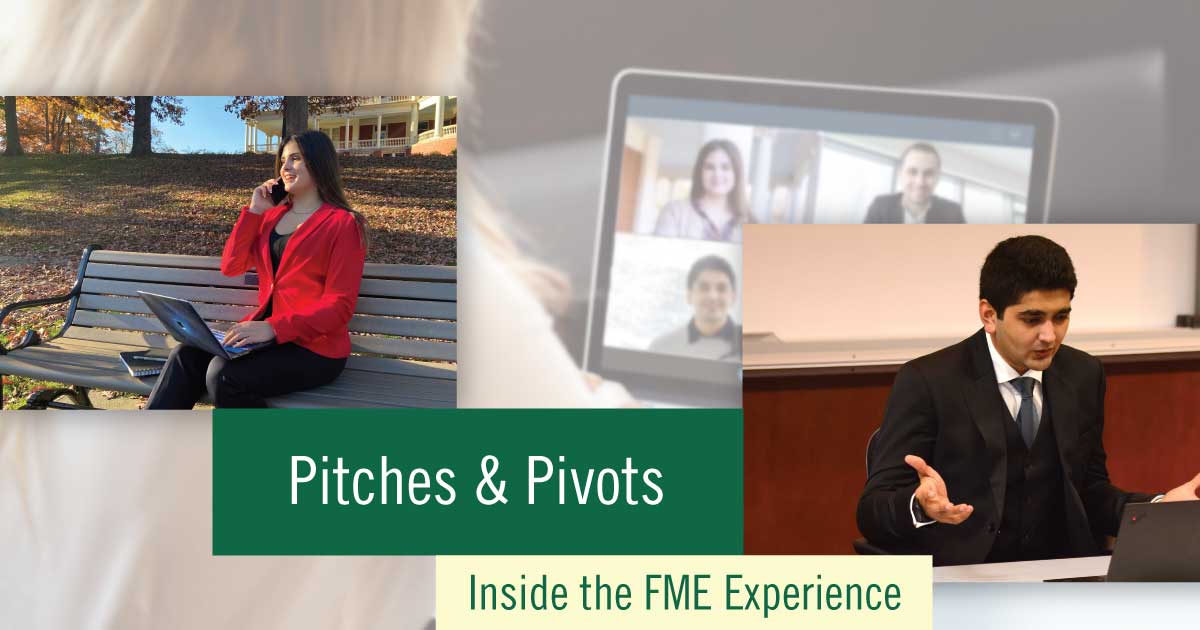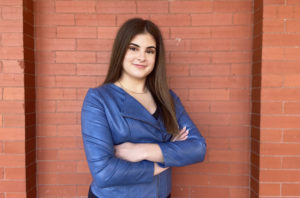3 Minutes, 3 Slides, and the Fate of a Business Idea

This is the third installment of an ongoing series about first-year students’ journey through the Foundations of Management and Entrepreneurship (FME) course.
As their course’s Rocket Pitch approaches, Arya Patel ’24 and his team work to perfect their presentation. They will have just three minutes and three PowerPoint slides to pitch the essence of their business idea. It isn’t a lot of time.
“It is very tight. You can’t talk about extra stuff. You are keeping track of each and every second,” Patel says. “Everyone is putting all their blood and sweat into making it the best.”
Students in Foundations of Management and Entrepreneurship, or FME as it’s commonly called, spend the school year fine-tuning business ideas and turning them into reality. Rocket Pitch is an early test in the course, as student teams reveal their business ideas and see if they pass muster with their classmates and professors.

Some of the business ideas will be chosen to continue on, while others will fall to the wayside. Whatever will happen, Patel feels ready. “I don’t know how it will go,” Patel says. “But, if our venture gets scrapped, I don’t care. I’m here for learning. Failure is a part of FME and entrepreneurship. It’s all about having an open mind and reflecting on the mistakes you make. Then you don’t make the same mistakes the second time.”
As part of an ongoing series, we’re telling the story of the FME experience, from the pitches and presentations to the pivots and products. In this installment, we follow the student teams as they finally settle on the business ventures they will pursue through the remainder of the school year.
Can’t Prepare for Everything
Rocket Pitch doesn’t just entail giving that tight three-minute presentation. After it’s completed, student teams then face questions from their peers. Those questions run the gamut, focusing on everything from the mundane to the very heart of what the business is all about.
Sophia Pantos ’24 and her team do their best to prepare, thinking of every possible question. She admits, though, that teams have to accept that they can’t prepare for everything. “There is a moment of fear when the professor says, ‘Does anyone have any questions?’ ” she says. “You can prepare as much as you want, but many times, there’s a question you haven’t prepared for. You have to just start talking, no matter how unsure or confident you are.”
“If our venture gets scrapped, I don’t care. I’m here for learning. Failure is a part of FME and entrepreneurship. It’s all about having an open mind and reflecting on the mistakes you make. Then you don’t make the same mistakes the second time.”
Arya Patel ’24
Pantos and her team’s business proposal, called Simple Scan, promises a more efficient shopping experience in supermarkets, allowing customers to scan and bag their own groceries. Patel and his team, meanwhile, focus on online learning with their plan for Find My Friend, a proposed platform that connects online students with others in their classes.
Ultimately, Rocket Pitch goes well for both teams, and Pantos and Patel are impressed by the business proposals of their classmates. “I was completely flabbergasted,” Patel says. “There were a lot of unique and creative ideas.”
The Decision
With Rocket Pitch now over, attention next turns to the FME professors, who weigh which business ideas would continue and which ones would not. At the time of Rocket Pitch, a typical FME class might have about 10 student business proposals. After the pitches, though, that number is whittled down to five or six.
In the end, both Simple Scan and Find My Friend don’t make the cut to continue. Patel and his teammates take it in stride. The FME professors thought the Find My Friend platform would need a lot of investment to get up and running, a feat that probably wasn’t possible during the time remaining in the school year. “We took the feedback in a positive manner,” Patel says. “In a short time period, our venture wasn’t financially viable.”

Because their business proposals are eliminated, Patel and Pantos are assigned to one of the remaining teams, though Pantos makes sure to chat with her old Simple Scan teammates one last time. “We had a nice group moment,” she says. “We said it had been great to work with each other.”
The Work Begins
Patel is assigned to a business called G&C Kit, which will be selling eco-friendly shower kits. Each of the remaining FME student teams is made up of about eight members, and all students are tasked with specific business roles that they will rotate through the remainder of the school year. Initially, Patel will be helping G&C Kit with supply chain operations and developing a website.
Meanwhile, Pantos joins a team called PRO. Standing for Portable Remote Office, the business will be making a four-panel portable office that allows remote employees to have a physical workspace wherever they may be. She initially will be part of PRO’s marketing team and will be running its social media.
To bond with her new teammates, Pantos and the rest of the PRO group gather online one night to play games and talk about their families, hometowns, and why they decided to come to Babson. The gathering starts at 6 p.m. and doesn’t end until midnight. “We’re now more comfortable with one another,” Pantos says. “We have established a close-knit group of individuals.”
Now that the final teams are set, the work of building a business can begin in earnest, with students conducting market research, seeking suppliers, and analyzing their finances. “After Rocket Pitch, that’s where the meat of FME lies,” Patel says. “That’s when you apply the theory you learned in the class.”
The rest of the school year promises to be busy. “There is so much work to do,” Pantos says. “This is where it gets real.”
Pitches and Pivots: Our FME series
Part 1: A Babson Rite of Passage Begins
Part 2: Think Big, Observe, and Create Solutions
Part 3: 3 Minutes, 3 Slides, and the Fate of a Business Idea (above)
Part 4: Preparing for Launch: It’s All About Manufacturing
Part 5: Product Problems, Inventory Issues, and Mailing Mishaps
Part 6: The Final Ledger: Closing Time in FME
Posted in Community




